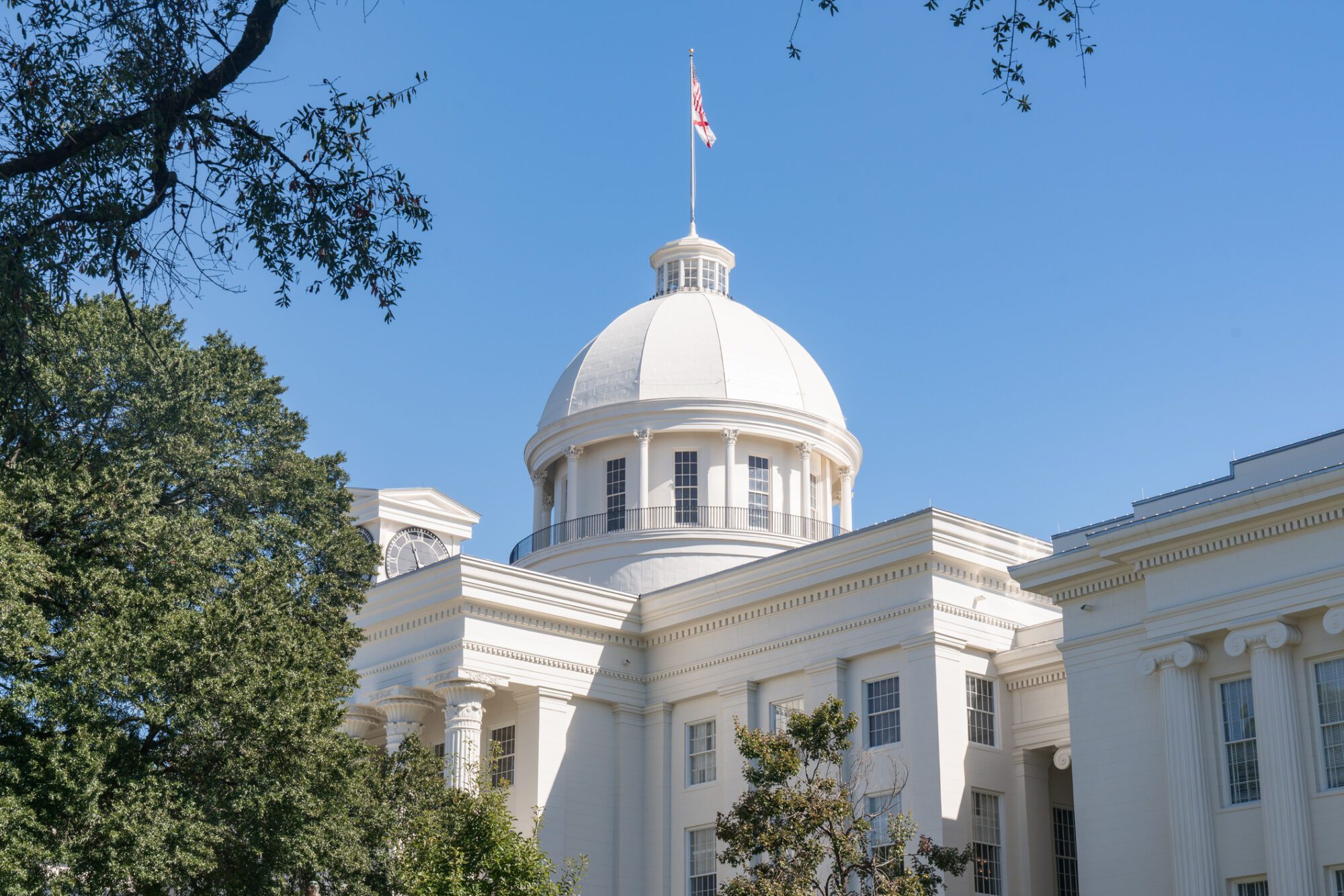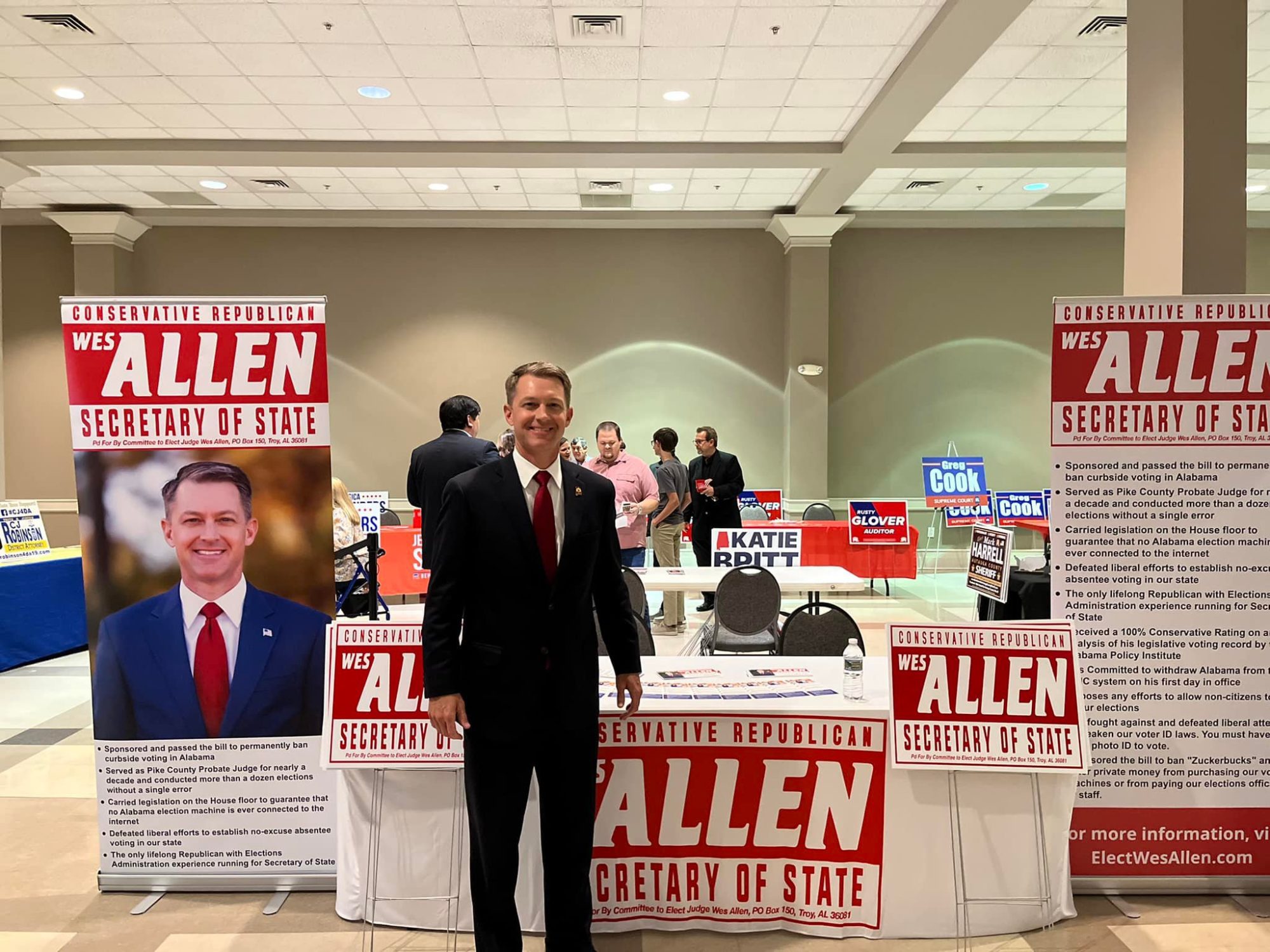Voting Rights Just Got a Second Surprise Win in Alabama
A bill to criminalize help with absentee ballots failed in the legislature, within days of the Supreme Court rejecting Alabama’s gerrymander. But advocates warn it may return next year.
Cameron Joseph | June 12, 2023


Alabama Republicans adjourned their legislative session last week without approving a bill to ban people from helping others with their absentee ballot—but that doesn’t mean their efforts are dead.
Republicans had been barreling ahead with legislation that would make it a felony in most cases to aid another person in requesting, filling out or returning voting ballots. The bill had sailed through one chamber of the Alabama legislature, and was widely expected to pass the other. But when the Alabama senate convened for its final day of the 2023 legislative session last Tuesday, the controversial bill was not among those included for floor debate.
That news was a welcome surprise to the bill’s opponents, a coalition of voting rights, civil rights and disability rights groups that expected it would pass. And it came in the same week as another unexpected victory for the state’s voting rights community, as the U.S. Supreme Court ruled on Thursday that Alabama’s aggressively gerrymandered congressional map violated the Voting Rights Act.
“We’re absolutely thrilled over here,” said ACLU of Alabama Policy & Advocacy Director Dillon Nettles.
Voting rights advocates were able to breathe a sigh of relief at these two victories for now, but that doesn’t mean that the fight is over: these groups are already bracing for Republicans to revisit the absentee ballot bill in next year’s legislative session.
“It will come back. I think it’s going to be a big issue next year. I think they’ll push it much earlier next year,” Senate Minority Leader Bobby Singleton, a Democrat, told Bolts.
Republicans’ House Bill 209 would have created draconian punishments for people if they help others fill out or return their absentee ballots, in an attempt to dramatically reduce efforts from get out the vote organizations.
The bill would have made it a class D felony punishable by up to five years in prison and $7,500 in fines for people who distribute, order, request, collect, complete, obtain or deliver an absentee ballot or ballot application on behalf of another person. That’s the same felony category as credit card fraud.
Anyone paid to help fill out an absentee ballot could have faced class C felony charges and a prison sentence as long as 10 years. Those who knowingly pay a third party to take any of these actions on an absentee ballot could have faced a class B felony charge—the same class of felony as first-degree manslaughter in Alabama—and one with prison sentences as long as 20 years.
“That bill would have made felons out of folks that are just trying to help their friends and neighbors,” said Alabama League of Women Voters President Kathy Jones. “If it had passed, we would have sued.”
Opponents of these proposals argue that these penalties would have a chilling effect on absentee voting by making it harder for people who need assistance to receive, fill out and return their ballots. And they say it would have an outsized impact on Black voters—especially those who live in the poor, rural Black Belt region of the state.
“The highest percent of absentee ballots come out of the Black community, out of the Black Belt counties. We don’t have a lot of jobs in those communities, so those who live in those communities have to drive 40, 50, 60 miles a day. So the absentee ballot is the way that they can vote,” said Singleton. “It could look to be voter suppression based on where the large number of absentees come from—out of the Black community.”
The bill would have exempted family members and roommates from the ban, and an amendment exempted people who help blind, disabled and illiterate people fill out their ballots from the criminal penalties.
But disability rights advocates remained alarmed by the legislation even after it was amended, saying it might violate federal law.
“We were very concerned about HB 209 even after the amendment was presented. According to the Americans With Disability Act, every individual should be provided equal opportunity to participate in all services, programs and activities,” Barbara Manuel, president of the Alabama chapter of the National Federation for the Blind, told Bolts.
Alabama is already one of the most difficult states in the nation for voters. It’s one of only three states that doesn’t allow any options for in-person early voting. It’s also one of only 15 states that requires voters to provide a specific excuse to request an absentee ballot. Approved reasons include if the voter won’t be in their home county on Election Day, if they’re ill or disabled, if they’ll be at work for the entire 10-hour stretch that polls are open, or if they’re a caregiver for a homebound family member. And Republicans passed a strict voter ID law more than a decade ago.
This bill is the latest GOP attempt to criminalize get out the vote efforts, casting a pall over normal political organizing in the name of election security. Alabama Republicans’ stated goal was to end what they describe as “ballot harvesting”—outside groups churning up large-scale operations to collect absentee ballots from voters and deliver them to election offices. Republicans claim these operations create ripe opportunities for voting fraud. While absentee ballot voting fraud does exist, there are only a few known examples (the best-known of which was actually carried out by a Republican operative in North Carolina who was eventually indicted for it).
But voting fraud has become a rallying cry for Republicans across the country as they seek to restrict methods of voting—especially by those Republicans who have embraced conspiracy theories about the 2020 election. A recent analysis by States Newsroom found that more than 100 election-related legal penalties were added to state laws in 2022 alone, across 26 different states. The majority of them were directed at voters and people assisting them.
This bill has been championed by Alabama Republican Secretary of State Wes Allen, who has pushed conspiracy theories related to the 2020 presidential election and who introduced a similar bill in 2022, when he was still in the legislature.
Allen said the bill “makes incredible strides in protecting the rights of Alabama voters to cast their own votes without undue influence” in an opinion column in the Alabama Ledger.
“HB209 would make it illegal to pay, or to be paid by a third party to collect absentee ballot applications or absentee ballots from Alabama voters. Furthermore, it would eliminate the ability of organizations to sow the seeds of chaos and confusion by sending pre-filled absentee applications into our state,” he continued. “Our elections are the foundation of our constitutional republic, and nobody should be paid for their absentee application or their ballot. Ballot harvesting should not be a job description.”
Allen’s vocal support of this bill is his latest attack on voting access. When he was a state lawmaker, Allen introduced legislation to ban curbside voting and outside donations and grants to help finance local election offices, both of which became law.
Allen was one of four election deniers to win a secretary of state election during the 2022 midterms. One of his first acts in office was to withdraw Alabama from the Electronic Registration Information Center (ERIC), a national system used by 30 other states to share voter registration data to identify people who had moved or died so they could be removed from voting rolls. That system became the target of right-wing conspiracy theory websites like the Gateway Pundit after the 2020 election, and Allen echoed their false claims, claiming the bipartisan, multi-state organization was a “Soros-funded, leftist group.”
In the session’s final stretch this year, HB 209 e seemed to be on a glide path to becoming law. It was approved by the GOP-dominated house by a 76-28 vote along party lines last month and had been approved in committee in the senate, where Republicans hold a 27-8 majority.
But the bill was surprisingly left off the schedule when the senate convened last Tuesday on the final day’s legislative session.
It’s unclear exactly why the bill stalled out. Sources say that some Republican lawmakers privately expressed concerns about collateral impacts on voters—and some speculated that the Republican tasked with pushing it through the senate had other priorities.
“Some concerns came from the Black caucus, and some came from some Republicans who thought the elderly would get confused,” an Alabama Republican who requested anonymity to discuss private conversations told Bolts.
Sources also speculated that Garlan Gudger, the bill’s lead sponsor in the senate, may have prioritized another controversial bill of his that targeted vaping products, to the detriment of the absentee voting bill. Neither bill passed the senate.
“He had the vaping bill, which had really been a priority for him,” said ACLU of Alabama Policy & Advocacy Director Dillon Nettles. “I think that that certainly did play out in our favor.”
Allen, Gudger and Representative Jamie Kiel, the Republican lawmaker who introduced the bill in the state House, didn’t respond to calls and emails requesting comment for this story.
The bill died in the Senate just days before the U.S. Supreme Court struck down Alabama Republicans’ aggressive congressional gerrymander, upholding a key section of the Voting Rights Act ruling to rule that the state had illegally diluted Black residents’ voting power. The conservative Supreme Court has been hostile to the Voting Rights Act in past rulings, so this 5-4 decision, with Chief Justice John Roberts and Justice Brett Kavanaugh joining the court’s liberal wing, came as a shock. Alabama will likely now have to create a second Black-majority congressional district.
The ruling does nothing to stop Alabama Republicans from pushing aggressive bills to curtail voting access, however. A decade ago, the U.S. Supreme Court ruled in Shelby County v. Holder that Alabama and other states with a history of racist voter suppression no longer had to submit any changes to their voting rules for preclearance by the federal government. That’s led Republicans to flood those states—and others—with a bevy of restrictive changes to election law. Voting rights advocates and Democrats think there’s a strong possibility that HB 209 will be reintroduced next legislative session—with more time for Republicans to push it through.
“It’s coming. This secretary of state is not going to give up,” said Singleton. “We know we’re going to have to have a real fight next year on this bill. It’s going to come back.”
“I don’t think we’re out of the woods,” said Nettles.
Sign up and stay up-to-date
Our weekly newsletter on the local politics of criminal justice and voting rights




